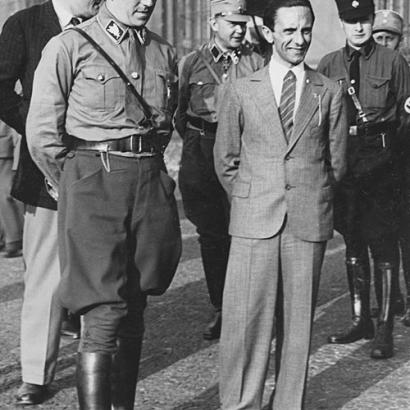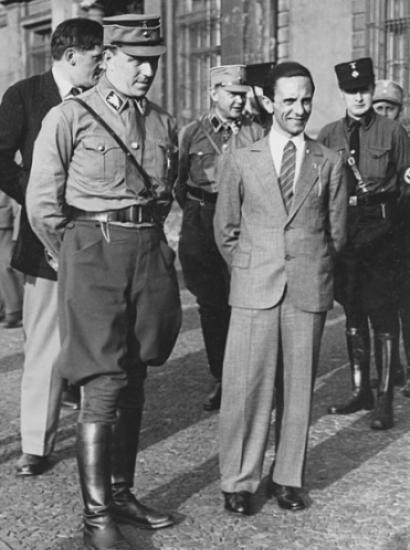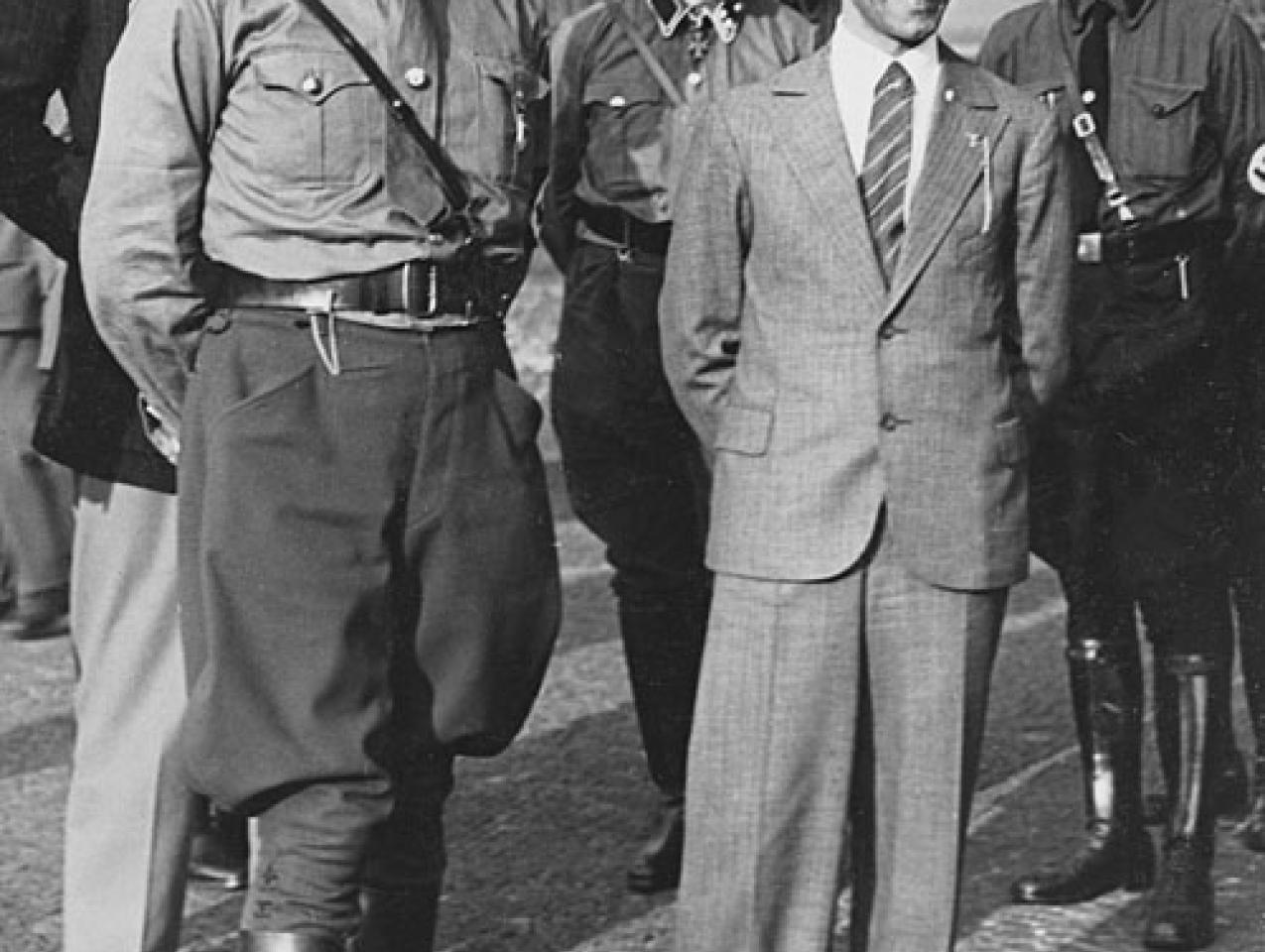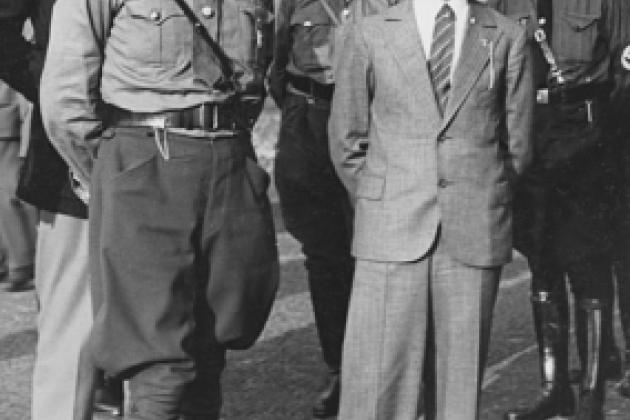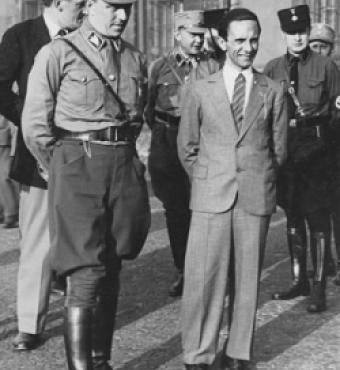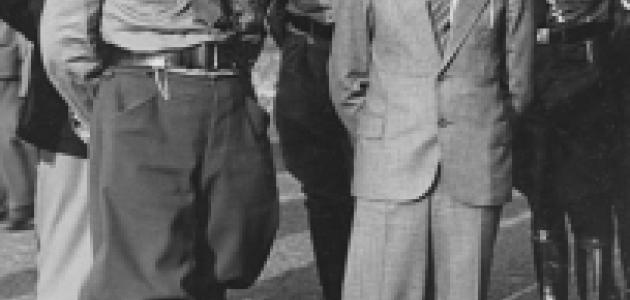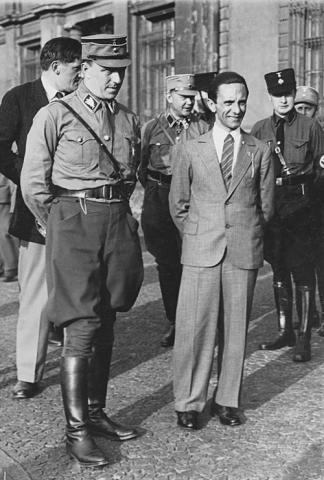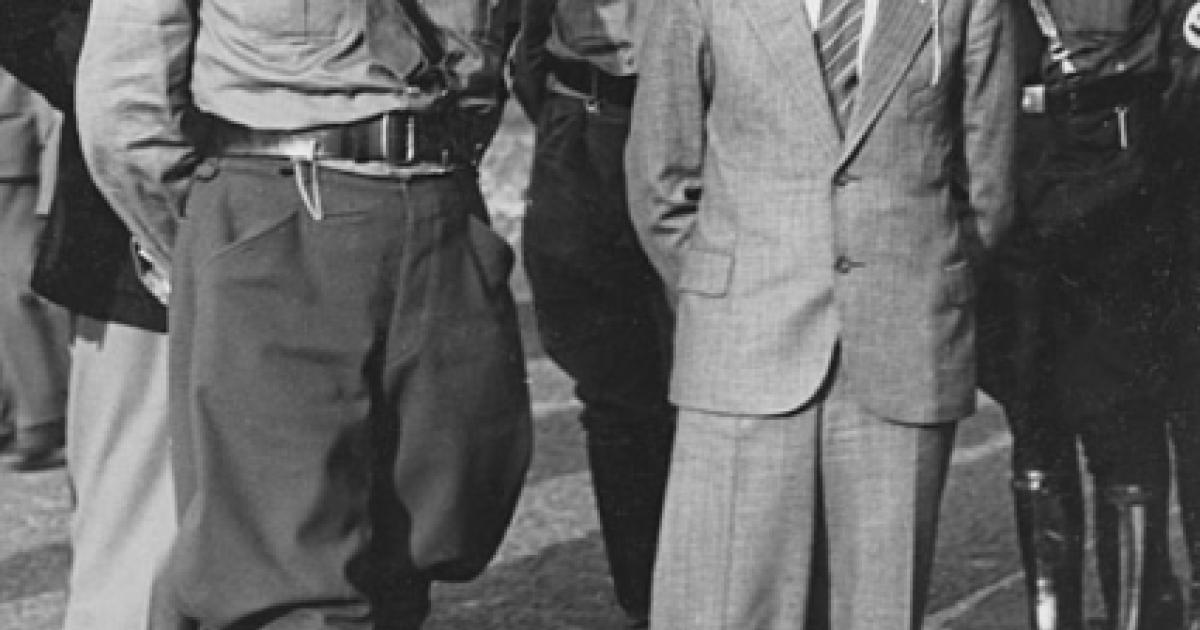- International Affairs
- US Foreign Policy
- World
- US
- Contemporary
- Military
- Regulation & Property Rights
- History
- Law & Policy
For weeks after V-E Day, Berlin was, in the words of an American eyewitness, “one great junkyard.” Among the junk was seven thousand pages of loose paper found in the courtyard of the Nazi Propaganda Ministry, which was under Soviet occupation. The paper was removed by an amateur junk dealer, who later recognized something peculiar about it: not only its superior quality, but the oversize typescript. By word of mouth, the existence of this unusual haul came to the attention of Lieutenant Colonel William Heimlich, a civilian American intelligence officer attached to the American occupation force who identified the author of the text as the late Nazi propaganda minister, Joseph Goebbels. Heimlich gave the junk dealer two cartons of cigarettes in exchange for this treasure.
Heimlich later claimed to have brought the seven thousand manuscript pages to the attention of his superiors in Berlin, as he was required to do, and that they expressed no interest in his find. Heimlich was then persuaded to hand the papers over to Herbert Hoover when the former U.S. president came to Germany in February 1947 as part of a fact-finding mission on behalf of President Harry Truman to assess that divided country’s food and other supply requirements and to report on the occupation policies in the three Allied zones. It was Hoover’s second visit to Germany in as many years. In the spring of 1946, Truman had tapped the great humanitarian of the World War I era to travel the world to, as Hoover later put it, “undertake the coordination of world food supplies to overcome the greatest famine in all history—the inevitable aftermath of the Second World War.”
Hoover’s main mission was humanitarian, yet just as in the days of the Treaty of Versailles, during these postwar trips he was also on the lookout for documents for his Hoover War Library at Stanford University. It was in part by combining the activities of humanitarian relief to destitute peoples and the capture of fugitive documents that Hoover had been able to make his library a world-class archive of primary documents on war, revolution, and peace. In postwar Germany, new opportunities beckoned. In 1946, the Library of Congress organized a mission to Germany to collect books, newspapers, periodicals, and official documents; and the Hoover War Library successfully lobbied to have a representative attached to the mission assigned to collect private manuscripts, especially letters, diaries, and memoirs.
During the February 1947 return trip to Germany, Hoover’s team of seven men was well qualified to help him carry out both agendas. Among his aides was Louis Lochner, one of two American journalists at the time expertly informed about Nazi Germany (the other being William L. Shirer, future author of The Rise and Fall of the Third Reich). For more than twenty years, during the rise of the Nazis from obscurity to absolute power in Central Europe, Lochner was chief of the Berlin bureau of the Associated Press. For many years he was president of the Foreign Press Association in Berlin and for six years president of the American Chamber of Commerce there, and his reporting from Germany won him the Pulitzer Prize in 1939. Lochner had served as the Hoover Library’s representative with the Library of Congress Mission, an assignment that brought him to Germany and Austria from August to October 1946. In accompanying Hoover to Germany in February 1947, Lochner was to use his native German and familiarity with Berlin to help interpret the scene for Hoover, and also to continue to help separate the wheat from the chaff among the recovered manuscripts, records, and rare books.
Upon Lochner’s return to New York City on February 23, 1947, Frank Mason, a former intelligence officer, foreign correspondent, and Hearst and NBC executive who handled public relations for the Hoover mission, showed him the Heimlich papers, purported to be the diaries of Joseph Goebbels from 1942 and 1943. Lochner was initially skeptical, mostly because the document—typewritten, and in extra-large typescript at that—hardly fit the traditional description of a diary. But as he began to read, his conviction mounted that the diaries were authentic and of inestimable value.
Lochner noticed that there were gaps in the narrative, pages missing, as well as other forms of distraction, as when diary pages bore the imprints of trampling feet. “No doubt some of the missing pages went up in flames,” he later remarked, “for there is a smell of burnt paper to the whole collection, and some pages are singed.” Someone had been either intent on destroying these papers or careless about preserving them. The product itself indicated that the diarist was someone special: the author used an especially heavy watermarked paper and large German-Gothic script of a sort rarely found on typewriters. Moreover, there was triple spacing between the lines, and the margins were wide. “No ordinary mortal in those days could have commanded such paper or permitted himself the luxury of such large type and generous spacing,” Lochner determined.
Lochner became engrossed in the diaries’ account, from inside Adolf Hitler’s inner circle, of Nazi Germany fighting a two-front war in 1942 and 1943. The entries cover, among other subjects, Goebbels’s delight at the political decline of Luftwaffe chief Hermann Göring, his political rival, in the wake of the Soviet victory at Stalingrad in February 1943, and his exasperation at Winston Churchill’s political endurance in the face of England’s disastrous military fortune. And throughout the wartime diaries Goebbels registers his and the Nazi elite’s mounting concerns over the mental and physical well-being of the Führer, especially after the Wehrmacht’s crushing defeat on the Volga.
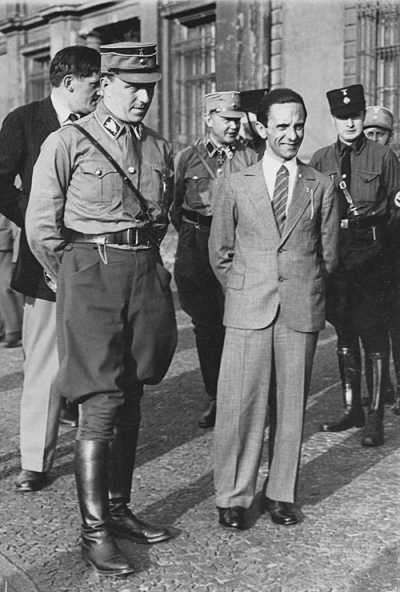
Joseph Goebbels, at right in suit, was the Nazi party’s master propagandist and, in the words of one historian, “the first ‘spin doctor.’ ” The discovery of his private diaries, typed on paper abandoned amid the ruins of the Third Reich, seemed almost too good to be true. But American journalist Louis Lochner confirmed their authenticity, later remarking that “My excitement grew as I realized that here was the most authentic narration of what went on behind the scenes in Naziland that had yet come to light.”
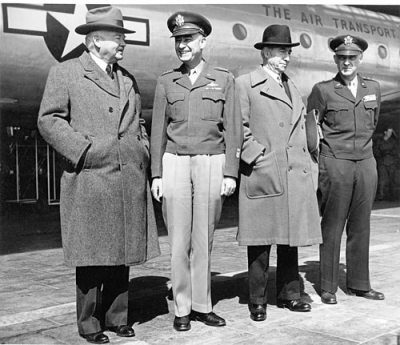
Former president Herbert Hoover lands in Berlin in April 1946 on a mission from President Truman to assess the world’s need for hunger relief. This photo shows Hoover, General Joseph T. McNarney, military governor in Germany, Hugh Gibson, and General Lucius D. Clay, deputy military governor. Gibson, a longtime Hoover associate, would arrange for the publication of the Goebbels diaries by Doubleday. Creating the book, however, would turn into a legal ordeal for Gibson and his associates.
Lochner is particularly struck by the frankness of the passages having to do with the physical and moral toll exacted by the Allied bombing raids on cities such as Essen, Dortmund, and Berlin. By the autumn of 1943, Goebbels reveals, Hitler and his inner circle are reluctantly considering the possibility of seeking a peace settlement with either Stalin or Churchill. Diarist Goebbels, who had all along doubted the wisdom of launching a war against the Soviet Union, voiced his impatience and frustration: “Sooner or later we shall have to face the question of inclining toward one enemy side or the other,” he wrote in the entry for September 10. “Germany has never yet had luck with a two-front war; it won’t be able to stand this one in the long run either.”
“ADOLF HITLER, I LOVE YOU”
Lochner read all this with fascination, yet a question gnawed at him as he went along: were these “diaries” in fact genuine? Was their discovery too good to be true? It certainly sounded like the man Lochner had come to know personally, in public events and private conversations: the free-and-easy abuse of everybody who disagreed with him, the thuggish language into which he frequently lapsed. Lochner recognized this voice—but he wondered, could it be someone’s deft imitation?
In order to test the diaries’ authenticity, Lochner turned to another document secured for the Hoover library by Lieutenant Colonel Heimlich and handed to Herbert Hoover in Berlin, a notebook containing what appeared to be the handwritten entries of Goebbels’s diary from 1925–26: a total of 192 bound pages salvaged from the Führerbunker by American intelligence officers and now, like the 1942–43 diaries, kept in a safe in a Hoover library office in the Graybar Building, on Lexington Avenue in New York City. There, in midtown Manhattan, Lochner read the 1925–26 diary entries as corroborative evidence. The job was not easy, because Goebbels’s handwriting is extremely difficult to decipher: upright letters crowded together. Lochner’s task was made more challenging by the physical condition of the diary, whose pages are in places burned, punctured, water-damaged, and, in the final pages, in tatters.
As he read on, Lochner recognized in the diary passages scenes from Goebbels’s early political career: “references to beer-hall fights, street brawls, and encounters with the police.” Goebbels, who had only recently made the acquaintance of Hitler, recorded his feelings about his idol and his impressions of their early encounters, and for Lochner these made the early Goebbels diaries especially compelling reading. On April 19, 1926, after a meeting with “the chief,” Goebbels expressed his euphoria in typically telegraphic style: “Adolf Hitler, I love you, because you are both great and simple. A genius. Leave-taking from him. Farewell! He waves.”
After a careful reading and comparison of the two diary fragments, Lochner was absolutely convinced that the diarist was Joseph Goebbels, who, loyal to his Führer to the end, had committed suicide in Hitler’s bunker in May 1945. By 1943, Goebbels had become notorious as the master propagandist for the Third Reich, even after the war began to go badly for Germany. He became what historian Gordon Craig calls “the first ‘spin doctor,’ transforming the shattering defeat at Stalingrad into a portent of future victory.” Returning to his study of the seven thousand pages of wartime diaries, Lochner was now riveted. He later wrote: “My excitement grew as I realized that here was the most authentic narration of what went on behind the scenes in Naziland that had yet come to light.”
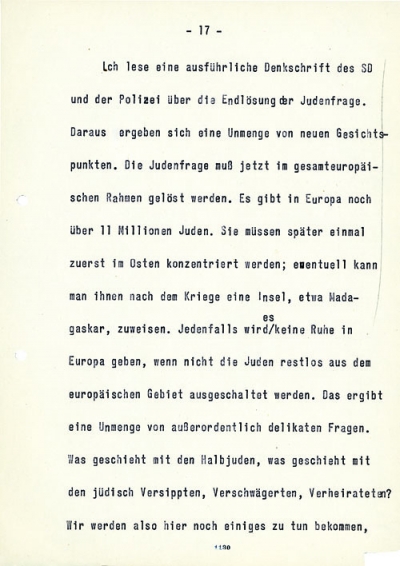
“I read a detailed report from the SD [Sicherheitsdienst, the Security Service of the SS] and police regarding a final solution of the Jewish question,” reads this passage (left) from the 1942–43 Goebbels diaries. “Any final solution involves a tremendous number of new viewpoints. The Jewish question must be solved within a pan-European frame. There are eleven million Jews still in Europe. They will have to be concentrated later, to begin with, in the East; possibly an island, such as Madagascar, can be assigned to them after the war. In any case there can be no peace in Europe until the last Jews are eliminated from the continent.” Louis Lochner explained the peculiarly large typescript as “a type developed for the nearsighted Hitler, that he might not have to wear glasses in reading his speeches in public, and one for Goebbels, that he might have space between lines for corrections.”
VERY DEAR DIARY
Once Lochner confirmed the authenticity of the diaries, Frank Mason set about trying to sell them for publication. He offered the serial rights to Cosmopolitan magazine for $1,000, but the editors turned him down. Ultimately, Mason decided to bring the diaries to the attention of another man who had served on the 1946 and 1947 Hoover missions: Hugh Gibson, a longtime Hoover associate and career Foreign Service officer, the former U.S. minister or ambassador to Belgium, Poland, and Brazil, and now the political editor at Doubleday and Company Inc. Gibson arranged a publishing contract at Doubleday, with Lochner hired to translate and edit a selection of about one-seventh of the 1942–43 diary entries and write an introduction for the published volume. Lochner would remain at his desk with the Goebbels diaries day and night throughout the summer of 1947.
The Doubleday book had just gone to press at the beginning of October when gossip king Walter Winchell got wind of it. He made several references to it on his broadcasts and in his news column. The major New York newspapers, the Tribune and the Times, followed with announcements of the forthcoming publication of The Goebbels Diaries. This news raised eyebrows at the Justice Department—in particular those of George Middleton, age sixty-seven, ex-playwright (Polly with a Past) and now a copyright expert at the Office of Alien Property—and set in motion the wheels of a criminal investigation.
The Office of Alien Property (OAP), suspecting that the diaries had been obtained irregularly and that Heimlich had no right to make a gift of them to the Hoover Library, began an investigation in Berlin. Lochner, Mason, and Gibson countered that the diaries story was a case of finders, keepers. As Lochner later wrote: “We tried to convince the Office of Alien Property that the Goebbels Diaries had been rightfully seized by the Russians under the terms of Unconditional Surrender when they took possession of the Propaganda Ministry in Berlin, but that they had deliberately abandoned the papers by throwing them on a rubbish heap. From there on, anyone who found them was entitled to keep them.” Besides, Lochner and his colleagues argued, General Lucius D. Clay, deputy U.S. military governor in Germany, had been present in Berlin when Heimlich made a gift of the diaries to Hoover.
During negotiations in New York and Washington, OAP officials twice broached to Doubleday’s attorney the idea that he should press Herbert Hoover to relinquish the original manuscript to the OAP, and both times the lawyer flatly declined. Hoover, meanwhile, sensing a “New Deal smear technique” meant to embarrass him in the press with stories of “a gigantic conspiracy” to reap great profits by “stealing diaries,” refused to budge from his position that the diaries were a legitimate gift to the Hoover Library. Eventually, however, he agreed, in writing, to hold the manuscript in escrow for the government until it determined whether Heimlich indeed had the authority to make a gift of it to the Hoover Library. Hoover took this step with great reluctance and then immediately regretted it, fearing the establishment of a dangerous precedent. As Hoover wrote to a former associate now at the War Department, “If the dictum [is] that the [Hoover] War Library material can be seized by the Alien Enemy Custodian, then a million items in the War Library are in jeopardy.”
Hoover’s concession cleared the way for the publication of the diary, although it hardly left Doubleday with an open field. Unwilling to seize the physical papers, the OAP decided to claim ownership of the literary rights, declaring itself to be the legal successor to Joseph Goebbels, and as such entitled to his literary estate. The government contended that the diary pages were war booty and that money realized from them should be applied to Germany’s reparations. Lochner and Mason and Doubleday contended that the diary pages were in the public domain and that no authority existed to vest them in the United States, a procedure with no precedent. The FBI, launching its own investigation in June 1948, proved no more able to untangle the thicket of ownership and copyright questions raised by the Goebbels diary controversy.
In order to be able to proceed with the publication of The Goebbels Diaries, Doubleday agreed to sequester all profits from the sale of the diaries in book form and from the serial rights. This was bound to amount to a considerable sum, because The Goebbels Diaries was a Book-of-the-Month Club selection, guaranteeing an initial print run in the hundreds of thousands. As part of the agreement, Doubleday printed in the front pages of the book a formal statement that the OAP had granted permission to publish “the manuscript purporting to be the diaries of Paul Joseph Goebbels.” Thus, the OAP had not only left open the possibility that it would eventually claim all profits obtained from the sale of the book, but had also cast doubt on the authenticity of the diaries.
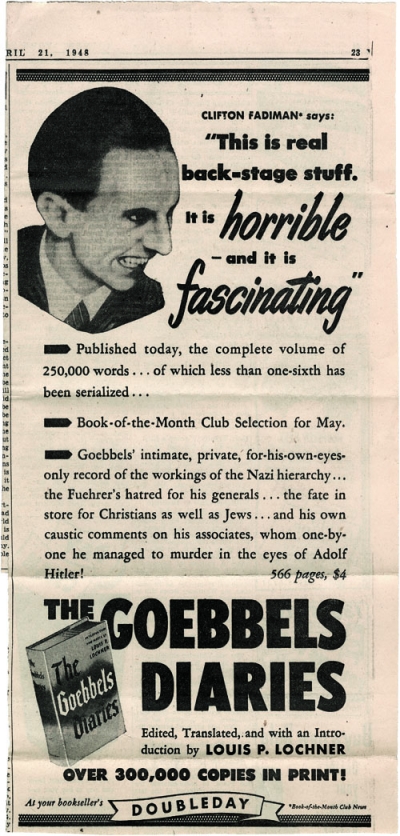
“Horrible . . . fascinating . . .” reads this newspaper ad for the newly released Goebbels Diaries. A reviewer for the New York Times hailed the book as a vivid portrait of “Dr. Joseph Goebbels, the little, limping, ratfaced high priest of nazism . . . one of the most completely evil men of the twentieth century.” The book was serialized in newspapers and magazines, was picked for the Book-of-the-Month Club, and became an instant bestseller.
Serialization in several dozen U.S. newspapers began in March 1948, and Life magazine of March 29 devoted the greater part of an issue to it. When the heavily advertised book appeared in print at the end of April, no major reviewer seemed inclined to question its authenticity. Orville Prescott, the daily book reviewer for the Times, had no trouble recognizing the voice of “Dr. Joseph Goebbels, the little, limping, rat-faced high priest of nazism . . . one of the most completely evil men of the twentieth century.” And prestigious reviewers such as Harold Nicolson, Allen Dulles, and William L. Shirer strongly endorsed the diaries’ validity, most authoritatively the Oxford historian Hugh Trevor-Roper in the pages of the New York Times Magazine. This did not prevent Communist attacks on the diaries, in radio broadcasts and newspaper editorials, as an elaborate American hoax. On March 23, 1948, Andrei Gromyko, Soviet ambassador to the United Nations, took to the floor of the General Assembly to heap scorn on the supposed diaries, dismissing them as “old rubbish.” Why would the Communists put such an effort into destroying the credibility of the diaries? Lochner believed it was because Goebbels’s vivid description of the devastation wrought by the Anglo-American bombing raids on German cities did not fit with the Soviet claim that the USSR had played the decisive role in the defeat of Nazi Germany.
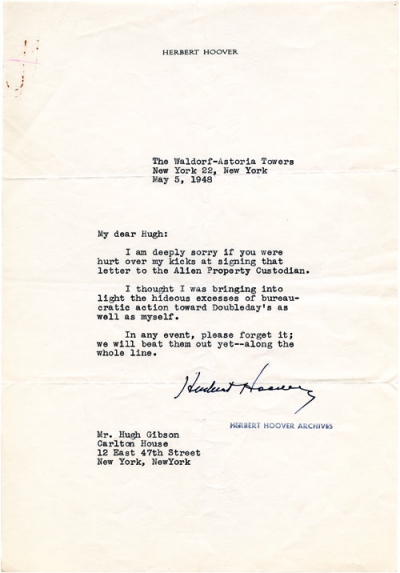
The denouement of the Goebbels Diaries legal battle was an out-of-court settlement with the Office of Alien Property—not at all satisfying (or lucrative) to the men who had brought it to publication. Here, Herbert Hoover writes to Hugh Gibson in 1948 to encourage his old friend, saying, “we will beat them out yet.” In the end, remaining copies of the erstwhile bestseller were destroyed, while the original diaries found a new home in the Hoover Archives.
As expected, the book became an instant bestseller, and in 1950 Mason and Lochner went to court to recover profits due to them from the publication of the diaries impounded by OAP. The civil action was filed March 8 in the United States District Court in Washington. In his statement for the court, Lochner noted that General Clay had referred in his recent book, Decision in Germany, to twenty-five thousand cases of the seizure of the property of avid Nazis. Lochner maintained that the U.S. government’s claim against Doubleday’s The Goebbels Diaries was in conflict with the Yalta and Potsdam agreements and, were it to be sustained, would make it possible for the heirs of leading Nazis to make claims in many of the cases to which Clay referred in his book.
The Office of Alien Property, by introducing a succession of technical motions in court, made it prohibitively expensive for the plaintiffs to continue their case. Eventually the OAP offered an out-of-court settlement, and Lochner and Mason were forced to accept. They were awarded $50,000 of the $132,000 due to them from Doubleday (chiefly as compensation for Lochner’s translation, annotations, and introduction), which after legal and other fees came to about $20,000 apiece—well short of what was owed them, and a far cry from the fantastic profits they had dreamed of reaping, including from the foreign book rights and foreign serializations.
In the midst of the standoff with the government in spring 1948, Hoover referred in a private letter to “a violent storm in a teacup over the Goebbels diary.” In fact, however, the toll that “this Goebbels monster,” as Mason called it, exacted on friendships and on the mental and physical health of those involved was steep. Hoover, Lochner, and Mason were baffled that Doubleday had so readily submitted to the Office of Alien Property’s demands, feeling that Gibson and his colleagues should have stood their ground and gone to court. In the event, Mason experienced a nervous breakdown, while Lochner suffered what he described as a “complete nervous breakdown which confined me for three months.” Gibson’s wife told one of Hoover’s associates that the Goebbels diaries affair was “killing” her husband, who took to his bed for what Gibson later said was “a good many weeks.”
When he had recovered, Gibson wrote a letter to Hoover to try to set the record straight, distraught at rumors about “my abusing your friendship in regard to the Goebbels diaries and ‘letting you pull my chestnuts out of the fire’ ”—a reference to Hoover’s assenting to hold the manuscript of the diaries in escrow for the government during its investigation so the publication of the book could proceed. In his reply to Gibson, Hoover tried to cheer up his old friend, urging him to “please forget it; we will beat them out yet—along the whole line.” In Berlin, meanwhile, Heimlich was interrogated by an agent of the Office of Alien Property, and although he was eventually unharmed by the long arm of the Justice Department, his good name came under a cloud as a result of what Mason diagnosed as the “curse of the diaries.”
Faced with the likelihood of being unable to earn a profit on the sale of The Goebbels Diaries, Doubleday sought and received authorization from the Office of Alien Property to destroy thirty thousand copies of the diaries in stock, on the grounds that the publisher no longer had an incentive to promote the work. Hoover and his legal advisers, sensing that the OAP had no intention of seizing the manuscript no matter the outcome of its legal investigation, decided to send the seven thousand diary pages to Stanford. On May 26, 1948, the 1942–43 Goebbels diaries arrived at the Hoover Library, where they have remained ever since.








